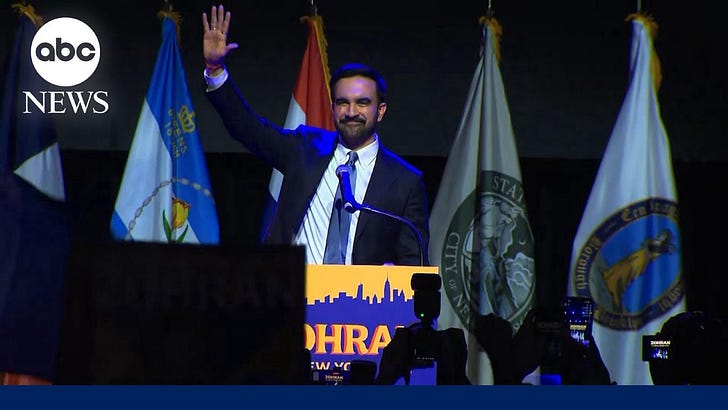Seattle Joins NYC On Commie Bandwagon
Katie Wilson elected next mayor.
Katie Wilson has defeated Seattle Mayor and Democratic incumbent Bruce Harrell. The margin was just 1976 votes, far less than New York Mayor-elect Zohran Mamdani’s 181,056 votes over Andrew Cuomo, but Wilson wasn’t running against a Trump-endorsed sex pest. Harrell was just a bad mayor who failed at every major issue that mattered to Seattle voters.
Local news outlets called the race for Wilson on Wednesday evening, and Harrell officially conceded on Thursday. This was a punch in the face to the traditional order, and quite the “comeback,” considering that such political luminaries as David Axelrod had claimed she’d lost the race on election night. The reason I put my little “smart quotes” around “comeback” is because Axelrod of all people should’ve understood how elections work in Washington state, where like here in Oregon, they have all mail-in ballots. The ones that skew heavily left usually arrive the latest. (Republicans are seeking to block any ballots received after Election Day, even if they were post-marked by Election Day. They pretty much hate democracy.) After Donald Trump used the “red mirage” too feed his 2020 election lies, pundits should probably wait until most of the votes are cast before declaring winners and losers, especially if Wilson’s supposed loss was the pillar of an argument about how Mamdani’s victory was a progressive outlier.
Wilson says she doesn’t mind if you call her a Democrat or a socialist. She’s 43 and has never previously run for office. (The New York Times seems very concerned about her “light resume,” even though Trump had no political experience prior to his 2016 election. That was his entire appeal! And the entirely unappealing JD Vance wasn’t elected to office until 2023, then he spent the next 18 months auditioning to be Trump’s running mate.) Wilson doesn’t have a college degree, either, as she dropped out of Oxford University six months prior to graduation (perhaps they’ll cover this in the movie).
Harrell was born in Seattle and grew up in the predominately Black Central District. He attended the University of Washington, turning down the Ivy League Harvard University. He played for the Washington Huskies and after graduating, he went on to get his law degree from UW, as well. He has a master’s from the City University of Seattle. He served on the City Council from 2008 to 2020.
Obviously, that’s quite a contrast to Wilson, who was born in Binghamton, New York, and moved to Seattle in 2004. Harrell has deep roots in Seattle, but Wilson represents the transplants — many of whom are millennials — who have transformed the city. Native Washingtonians are now the minority in Seattle.
When she settled in Seattle, Wilson deliberately cut herself off financially from her well-off parents and worked in a lab, a bakery, a law office, and in construction (also good montage material for a movie.)
“Psychologically, it really did something to me,” Wilson said.
In 2011, Wilson co-founded the non-profit Seattle Transit Riders Union, whose mission is improving public transit and workers’ rights in the Seattle area. She’s served as executive director since 2019. Prior to running for Senate, Vance showed far less interest in actual public service, just personal enrichment.
Seattle is one of the 10 most expensive cities in the U.S. The average single family home is valued at $941,803, and the average monthly rent is $2,110, which is 30 percent above the national average. The estimated income needed just for necessities is $89,260, and if you want to live comfortably, you need to pull in around $178,520. Amazon tech executives aren’t the ones working in restaurants, bars, and providing local entertainment.
“Before I decided to run for office, my husband and I were just kind of juggling our kid back and forth,” Wilson said. “We didn’t have her in daycare because it’s so expensive. But then when I decided to run, we’re like, we really need childcare.”
She mentioned often on the campaign trail that daycare for her two-year-old costs about $2,200 a month. Her political opponents dinged her when it was revealed that her parents help with child-care expenses. I’m not sure how that makes her a hypocrite. She’s advocating for policies that would benefit people whose parents aren’t professors in New York. If the only people who can live in a city are the well-off and those too poor to move, it’s difficult for that city to thrive. This isn’t about “free stuff” but about building a more sustainable model. During the campaign, Harrell hit Wilson on the costs of her proposals — a billion-dollar bond to fund social housing and building 4,000 emergency homeless shelter units that he said would cost another $500 million or more — but he didn’t offer anything better.
Politicians have claimed they would address overall affordability, housing costs, and homelessness in the city, but Wilson quickly defined herself as someone who’d actually solve these problems, not just talk about them while appeasing corporate interests.
“I think that the affordability crisis of the last few years has kind of brought that to a fever pitch where people have not felt that their elected leaders are actually fighting for them, actually fighting for affordable housing, for affordable childcare, for the things that are affecting them day to day,” Wilson told The New Republic’s Monica Potts in October. “And the failure of a certain brand of Democratic Party politics to stop Trump’s election.... It’s like, OK, now we see that the government can move fast. It can do some really bad things really fast. So why can’t it be some good things?”
Democrats have been slow to embrace “affordability” as a pressing issue. Yes, Kamala Harris offered some solid policies targeting affordability and housing during her presidential campaign, but the major focus was saving democracy from Trump (obviously a valid goal). Alas, working class voters of all races care more about making their rent than dodging fascism. It also didn’t help Harris that she was the standard bearer from an administration that voters believed (fairly or not) failed to address inflation. If Zohran Mamdani had served as Eric Adams’ deputy mayor, voters might have found his entire pitch less credible.
Of course, Donald Trump took office and made everything worse, which was such an obvious outcome, it should have been his campaign slogan. The one upside is that it’s now Trump and the GOP who are denying economic realities and claiming anyone complaining about costs were brainwashed by TikTok.
Wilson also personally disputes the narrative that progressives are all unyielding ideologues who can’t build a winning coalition, while centrists are the sensible “adults in the room.”
“I’m very focused on results,” Wilson told KUOW shortly before the election. “I’m a very pragmatic person, and I believe in working together even if you don’t agree on everything.”
Mamdani and Wilson’s victories been described as a preview to a “Democratic Tea Party,” but the 2010 GOP Tea Party was a movement fueled almost entirely by rage and resentment, not actual ideas and dreams of a better tomorrow. Motivations aside, the outcome of both Tea Parties could prove similar — prelude to a larger establishment rout.






the 2010 GOP Tea Party was a movement fueled almost entirely by rage and resentment,
And lots and lots of Koch money, of course.
LET TYRANTS FEAR